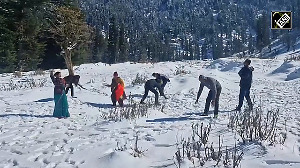"...in terms of the US-India agreement we are in discussions with the Indian government. They are currently formulating a plan, which would separate the civilian and military nuclear programmes. We're going to be in contact with them because that's an important component of this deal, so it's an issue that we're continuing to work with them on," State Department spokesman Sean McCormack said on Wednesday.
As a follow up to the recent visit of India's Foreign Secretary Shyam Saran, Burns will be in New Delhi next week to follow up on the civilian nuclear deal issue as also discussing the visit of President George W Bush to India. Under the agreement reached between Bush and Prime Minister Manmohan Singh on July 18 2005, the US would lift restrictions on the supply of reactors and fuel for India's civilian nuclear programme provided New Delhi fulfilled a series of obligations.
The spokesman did not respond to a related query of Pakistan also wanting the same kind of a civilian nuclear arrangement with the United States. In the past members of Congress have asked administration officials about this and the refrain has been along the lines that no other country other than India is being offered this arrangement.
India-US pact for transfer of civilian N-reactors
Burns was the last senior administration official to specifically address this topic at the Senate Foreign Relations Committee. The Bush administration has not discussed the status of the civilian nuclear energy cooperation talks that is currently taking place between the US and India.
Administration officials, knowing the sensitivities in both Washington and New Delhi are unwilling to discuss anything in detail on the civilian nuclear agreement other than discussing the subject only in very broad terms.
Recently Secretary of State Condoleezza Rice was asked about the issue and she too refused to be dragged into a conversation about the status of specific nuclear reactors like the CIRUS.






 © 2025
© 2025